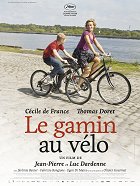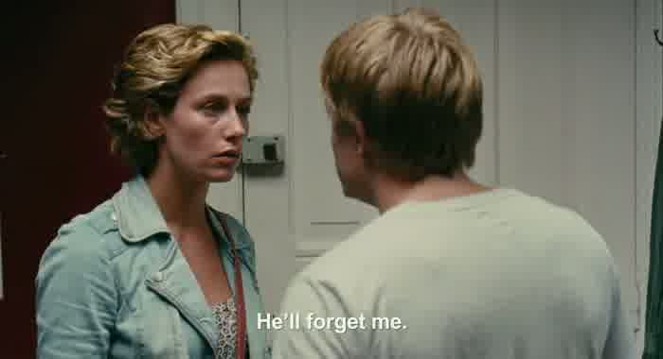Cinematography:
Alain MarcoenCast:
Thomas Doret, Cécile de France, Jérémie Renier, Fabrizio Rongione, Olivier Gourmet, Jean-Michel Balthazar, Egon Di Mateo, Lara Persain, Myriem Akeddiou (more)Plots(1)
Cyril, almost 12, has only one plan: to find the father who left him temporarily in a children's home. By chance he meets Samantha, who runs a hairdressing salon and agrees to let him stay with her at weekends. Cyril doesn't recognize the love Samantha feels for him, a love he desperately needs to calm his rage. (Wild Bunch Distribution)
Reviews (5)
“I don’t dream.“ At first glance, a boy who knows how things work and how to get by. However, it sons become clear that he cannot face up to the challenges presented by society, as unfeeling as he is, though he is thoughtfully unfeeling. He is at least aware of the connection between survival and speed. He has to be fast and the film is also unusually fast. “You hesitate for a moment and you miss something important” applies both for Cyril and for the viewer. Jean-Pierre and Luc Dardenne characterise their protagonist in action and through action, not by means of words, for which there isn’t much time. The sociological context is not and cannot be limited to the family environment, as it is greatly broadened into a much less “definable” space, which contributes significantly to the film’s tremendous authenticity. Credit for this is also due to the lead actor, whose “waywardness” seems utterly natural in and of itself, and even more so in light of his circumstances. The indifference of Cyril’s father towards him forces the boy to seek out a surrogate father figure, while it is clear that Wes and Samantha are only temporary substitutes, not a long-term solution. Such a solution can be brought about only by the boy’s acceptance of the obstacles that life presents and which he avoids through most of the film (which is entirely logical, given his age). The final humble acceptance of a hard fall (in both the literal and the figurative sense) may indicate either an early start to growing up or passive submission to an unfortunate fate. We have to decide for ourselves where a boy like Cyril can go in life. With its open-ended conclusion, among other aspects, The Kid with a Bike is reminiscent of other films for grown-ups that take a child’s perspective into account, particularly Bicycle Thieves and The 400 Blows. Thanks to the timelessness of the issues that it raises, The Kid with a Bike may – like those films – someday be considered a classic. 80%
()
The Kid with a Bike is a perfectly natural movie. It presents with ease the story of a boy who doesn’t know how he is doing. He has a dad who does not give a shit about him and does not want to take care of him. But the boy doesn’t want to be in a children’s home, so he does everything he can to live the life of a normal boy. At that moment, Samantha starts taking care of him and tries to guide Cyril in the right direction. However, around him there is evil luring, attracting and tempting him and the question is how he is going to react. Time will eventually show to which side he is going to lean. The five stars are not just because this film is shot beautifully and with a deep feeling, but because this movie showed me a reality that I encountered several times in primary school and I encounter it even today.
()
I apologize in advance for the intellectual autism, for which others have a patent on FilmBooster, but The Kid with a Bike evoked it in me and I can no longer keep it inside. I am of the opinion that our existence in the world is based on symbolic matter, which we call reality, and movement in this matter is governed by the keys of pre-understanding, attitudes, values and re-presentations that allow us to a) understand the world, b) belong to a group of those who understand it the same or similarly (this sort of strange gang is then called "society"). This is how the French philosopher Louis Althusser defines ideology. The fact that we see the ideologies of others and do not see our own is not the result of not having any, but rather that we perceive our version as a completely natural condition of our own social existence (it is "more real for us than reality itself," to paraphrase my favorite Slovenian team SK Slavoj Žižek). Films such as The Kid with a Bike and A Separation are unique in that they can transfer a fragment of an "unprejudiced" situation to the screen, during which one can realize how one composes and distorts the image of reality. If The Kid with a Bike had been filmed by Northerners, there would probably be some victimization of the protagonist, who would be a victim of social conditions (which is understandable in a culture based on the values of strong social solidarity). An uncompromising analyst like Haneke would focus on the pathology of behavior and derive from it the pathology of modern society. But the Dardenns' veristic approach is that we do not find any similar support in The Kid with a Bike, we are constantly forced to reconsider our attitudes, we do not have the opportunity to run to classic (social, class, religious) explanations of why the characters behave the way they behave - the boy initially seems like a victim, but later shows a chilling activity and prevents us from being emotionally moved by his purity (paradoxically, the fact that he does not do evil out of material greed does not make him much cleaner and more trustworthy, but rather raises the question of his ability to emotionally manipulate - similarly to how others try to manipulate him). We are in it with the characters - relatively free in their choices, exposed to the uncertainty of such freedom. Like A Separation, this film is fascinating with the free flow of meaning, moral impartiality and a completely precise capture of aggravated and everyday situations. If social drama is of key importance in today's world burdened by dominant versions of reality and activated patterns of perception, it is in this field - as a reminder that we live in a completely relative world, which we can seize through ideological re-presentation, but parts of which will always remain a "symbolic surplus" (an apparition) that escapes us. For me, enjoyment of the Dardenns means the experience of the changes of one's own reading of what is happening on the screen and the realization of the biased position of the interpreter (sometimes one simply tends to forget how confident one is in the "correctness" of one's position). This film is completely unique, at least for someone who only knew the Dardenns from hearsay. Moreover, it is breathtaking craftsmanship with such a well-thought-out construction that one almost completely overlooks it in absolute authenticity (but it is not a construct hanging in a vacuum like the Czech film Flower Buds). End of therapy.
()
(less)
(more)
A film that is shot in a very naturalistic style, almost leaning toward a documentary approach, about a boy's emotional and moral struggle as he copes with feelings of loneliness and betrayal after being sent to a children's home by his father, who shows complete disinterest toward him. It's no wonder that the boy goes astray and soon breaks the law. In terms of content, The Kid with a Bike is factual, precise, and reliable. As for the form, I am not as satisfied, but I acknowledge that the French creators cannot be blamed for the fact that a piece of Kachyňa's poetics or Truffaut's emotional engagement is missing in their film. Overall impression: 65%.
()
He’s just a kid on a bike, but during the time we follow him, he experiences so much that it would be enough for another child's entire childhood. On one hand, a childhood spoiled, but on the other hand, also beautiful. An excellently acted film that shows that it really takes very little, just to film it well and present it overall, to have a great movie to watch.
()

